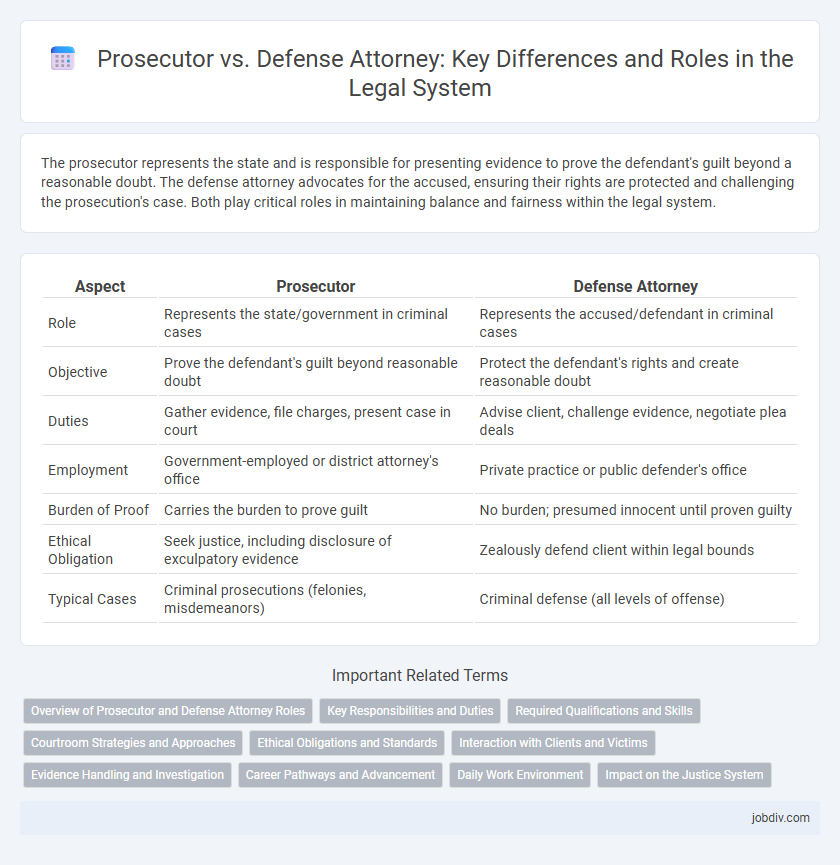The prosecutor represents the state and is responsible for presenting evidence to prove the defendant's guilt beyond a reasonable doubt. The defense attorney advocates for the accused, ensuring their rights are protected and challenging the prosecution's case. Both play critical roles in maintaining balance and fairness within the legal system.
Table of Comparison
| Aspect | Prosecutor | Defense Attorney |
|---|---|---|
| Role | Represents the state/government in criminal cases | Represents the accused/defendant in criminal cases |
| Objective | Prove the defendant's guilt beyond reasonable doubt | Protect the defendant's rights and create reasonable doubt |
| Duties | Gather evidence, file charges, present case in court | Advise client, challenge evidence, negotiate plea deals |
| Employment | Government-employed or district attorney's office | Private practice or public defender's office |
| Burden of Proof | Carries the burden to prove guilt | No burden; presumed innocent until proven guilty |
| Ethical Obligation | Seek justice, including disclosure of exculpatory evidence | Zealously defend client within legal bounds |
| Typical Cases | Criminal prosecutions (felonies, misdemeanors) | Criminal defense (all levels of offense) |
Overview of Prosecutor and Defense Attorney Roles
Prosecutors represent the government and are responsible for presenting evidence to prove the defendant's guilt beyond a reasonable doubt. Defense attorneys advocate for the accused, protecting their legal rights and challenging the prosecution's case to ensure a fair trial. Both roles are crucial to maintaining the integrity of the criminal justice system and upholding due process.
Key Responsibilities and Duties
Prosecutors hold the responsibility of presenting evidence to prove the defendant's guilt beyond a reasonable doubt, ensuring justice is served on behalf of the state or government. Defense attorneys focus on protecting the constitutional rights of the accused, challenging the prosecution's case, and providing a robust defense to prevent wrongful convictions. Both roles require in-depth knowledge of legal procedures, effective case preparation, and courtroom litigation skills.
Required Qualifications and Skills
Prosecutors require a Juris Doctor degree, passing the bar exam, and extensive knowledge of criminal law and courtroom procedures to effectively represent the state. Defense attorneys must possess strong analytical skills, negotiation abilities, and a deep understanding of constitutional rights to protect their clients from wrongful convictions. Both roles demand excellent communication, critical thinking, and ethical judgment to uphold justice within the legal system.
Courtroom Strategies and Approaches
Prosecutors prioritize building a compelling narrative supported by concrete evidence and witness testimonies to establish the defendant's guilt beyond a reasonable doubt. Defense attorneys focus on creating reasonable doubt by challenging evidence credibility, uncovering procedural errors, and highlighting inconsistencies in witness statements. Both parties employ strategic examination and cross-examination techniques to influence the jury's perception and strengthen their case positioning in court.
Ethical Obligations and Standards
Prosecutors must uphold ethical obligations to seek justice, ensuring evidence is disclosed and refraining from prosecuting without probable cause. Defense attorneys are bound by standards requiring zealous representation, client confidentiality, and advocating within legal bounds. Both roles are defined by professional codes that balance pursuit of truth with protection of clients' rights.
Interaction with Clients and Victims
Prosecutors prioritize building trust with victims by providing clear communication about case progress and legal rights, ensuring victims feel supported throughout the judicial process. Defense attorneys focus on establishing confidential and open dialogue with clients to develop a strong defense strategy, emphasizing clients' rights and informed decision-making. Both roles require empathetic interaction but differ in their objectives: prosecutors advocate for justice on behalf of the state, while defense attorneys protect the client's interests.
Evidence Handling and Investigation
Prosecutors meticulously gather and present incriminating evidence to establish the defendant's guilt beyond a reasonable doubt, ensuring adherence to legal standards and chain of custody protocols. Defense attorneys critically examine the prosecution's evidence for inconsistencies, challenge the admissibility of improperly obtained materials, and conduct independent investigations to uncover exculpatory evidence or procedural errors. Effective evidence handling and thorough investigation by both parties are crucial in safeguarding the defendant's rights and maintaining the integrity of the judicial process.
Career Pathways and Advancement
Prosecutors and defense attorneys follow distinct career pathways shaped by their roles in the criminal justice system, with prosecutors often beginning as assistant district attorneys before advancing to senior or supervisory positions within the public sector. Defense attorneys typically start their careers in private practice or public defender offices, gaining trial experience to transition into specialized fields such as criminal defense or appellate law. Advancement in both careers depends on courtroom success, legal expertise, and professional networking, with opportunities for becoming judges, legal educators, or policy advisors.
Daily Work Environment
Prosecutors spend their days reviewing case files, interviewing witnesses, and presenting evidence in court to prove the defendant's guilt beyond a reasonable doubt. Defense attorneys focus on protecting their clients' rights by investigating the prosecution's claims, negotiating plea deals, and advocating for acquittal or reduced sentences. Both roles require extensive legal research, collaboration with law enforcement, and frequent court appearances under high-pressure conditions.
Impact on the Justice System
The dynamic between prosecutors and defense attorneys shapes the balance of justice by ensuring both accountability and protection of individual rights. Prosecutors seek to uphold public safety through pursuing lawful convictions, while defense attorneys safeguard fair trials and prevent wrongful convictions. This adversarial process reinforces the integrity of the justice system and promotes equitable outcomes for all parties involved.
Prosecutor vs Defense Attorney Infographic

 jobdiv.com
jobdiv.com